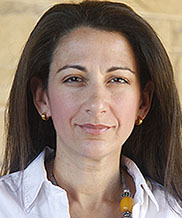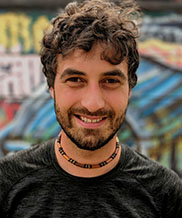Processed-based Assessments: Analyzing Critical Thinking, Decision Making, Collaboration
 Janine Zacharia was Jerusalem Bureau Chief and Middle East Correspondent for the Washington Post from December 2009 through April 2011. During her time at the Washington Post, she reported widely throughout the Middle East beyond Israel, the West Bank and Gaza Strip, including assignments in Egypt, Jordan, Lebanon, Iraq, Bahrain, Saudi Arabia, the UAE and Turkey. She reported on the uprisings in Egypt and Bahrain as they began in early 2011. From 2005-2009, Ms. Zacharia worked as chief diplomatic correspondent for Bloomberg News based in Washington. During this period, she traveled to more than 40 countries with then U.S. Secretary of State Condoleezza Rice and other senior administration and military officials. Ms. Zacharia’s earlier career included five years as Washington bureau chief for the Jerusalem Post, and five years in Jerusalem working for various news outlets including the Reuters news agency. She was a regular contributor to the New Republic and has appeared routinely as a cable news analyst on MSNBC, CNN and other networks.
Janine Zacharia was Jerusalem Bureau Chief and Middle East Correspondent for the Washington Post from December 2009 through April 2011. During her time at the Washington Post, she reported widely throughout the Middle East beyond Israel, the West Bank and Gaza Strip, including assignments in Egypt, Jordan, Lebanon, Iraq, Bahrain, Saudi Arabia, the UAE and Turkey. She reported on the uprisings in Egypt and Bahrain as they began in early 2011. From 2005-2009, Ms. Zacharia worked as chief diplomatic correspondent for Bloomberg News based in Washington. During this period, she traveled to more than 40 countries with then U.S. Secretary of State Condoleezza Rice and other senior administration and military officials. Ms. Zacharia’s earlier career included five years as Washington bureau chief for the Jerusalem Post, and five years in Jerusalem working for various news outlets including the Reuters news agency. She was a regular contributor to the New Republic and has appeared routinely as a cable news analyst on MSNBC, CNN and other networks.
 Daniel Schwartz is dean of Stanford Graduate School of Education and an expert in human learning and educational technology. Schwartz oversees a laboratory whose computer-focused developments in science and math instruction permit original research into fundamental questions of learning. He has taught math in rural Kenya, English in south-central Los Angeles, and multiple subjects in Kaltag, Alaska. This diversity of experience informs his work. Among many honors, Schwartz was named Graduate School of Education Teacher of the Year for 2015. His latest book, The ABCs of How We Learn: 26 Scientifically Proven Approaches, How They Work and When to Use Them, distills learning theories into practical solutions for use at home or in the classroom. NPR noted the book among the “best reads” for 2016.
Daniel Schwartz is dean of Stanford Graduate School of Education and an expert in human learning and educational technology. Schwartz oversees a laboratory whose computer-focused developments in science and math instruction permit original research into fundamental questions of learning. He has taught math in rural Kenya, English in south-central Los Angeles, and multiple subjects in Kaltag, Alaska. This diversity of experience informs his work. Among many honors, Schwartz was named Graduate School of Education Teacher of the Year for 2015. His latest book, The ABCs of How We Learn: 26 Scientifically Proven Approaches, How They Work and When to Use Them, distills learning theories into practical solutions for use at home or in the classroom. NPR noted the book among the “best reads” for 2016.
 Nick Haber is an Assistant Professor at The Stanford Graduate School of Education. Nick is interested in machine learning, computer vision, and human-computer interaction. His work thus far has primarily involved face detection and tracking, using Constrained Local Models. On top of this, he developed engagement scoring, gaze tracking, and emotion detection for the purpose of testing and producing engaging content in online courseware. Currently, his efforts are directed at applying machine learning and computer vision techniques to recognize emotions, so that the device can provide feedback to its users in a way that helps them learn these cues on their own.
Nick Haber is an Assistant Professor at The Stanford Graduate School of Education. Nick is interested in machine learning, computer vision, and human-computer interaction. His work thus far has primarily involved face detection and tracking, using Constrained Local Models. On top of this, he developed engagement scoring, gaze tracking, and emotion detection for the purpose of testing and producing engaging content in online courseware. Currently, his efforts are directed at applying machine learning and computer vision techniques to recognize emotions, so that the device can provide feedback to its users in a way that helps them learn these cues on their own.
 Chris Piech is an Assistant Professor of Computer Science Education at Stanford University. His research is in machine learning looking to understand human learning. He also believes that in 2019 there is a unique opportunity to build better learning experiences that serve more students. Chris is teaching CS398 which is a research-level course that explores ways to leverage; modern AI, online platforms and large datasets to address challenges in education. His PhD advisors are Leo Guibas and Mehran Sahami.
Chris Piech is an Assistant Professor of Computer Science Education at Stanford University. His research is in machine learning looking to understand human learning. He also believes that in 2019 there is a unique opportunity to build better learning experiences that serve more students. Chris is teaching CS398 which is a research-level course that explores ways to leverage; modern AI, online platforms and large datasets to address challenges in education. His PhD advisors are Leo Guibas and Mehran Sahami.